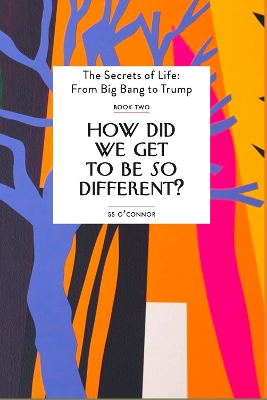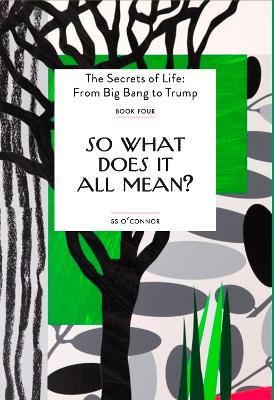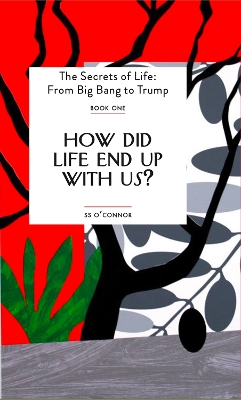The Secrets of Life : From Big Bang to Trump
2 primary works • 3 total works
Book 2
How is it we humans only arrived after 99.995% of the time there's been life on earth - and yet we're now so dominant? If mutations take generations to have an effect, how did we manage to change so completely in just a blink in time? And why were our rulers and societies always so horrible - yet we endlessly put up with them?
Book One of The Secrets of Life quartet began the long narrative of existence by showing how the forces that Big Bang unleashed drove the Earth's evolutionary developments, and how after 3.8 billion years of life and the extinction of many billions of species, our obscure forest-dwelling ancestors emerged in East Africa. Yet what, Book Two asks, were the steps that led to us humans becoming so totally different to anything that had appeared before? If we really were just another kind of animal off the production line of life, then what were the revolutions that turbo-charged our unique abilities?
How did we evolve so that we could alter ourselves in an instant, and avoid being stuck in an evolutionary niche like every other organism? How did we manage to create the intelligence and insights that allowed us to make our own decisions in life? And where did the free will come from that would let us override the drives of our animal pasts?
We alone of all the world's species have ever been able to predict the future, and then change our behaviour so that it suited our ambitions. But how did we grow our brains and imaginations so greatly that we could achieve this? And only we have evolved the capacity to reject the genetic instructions that shaped us. But why do we think this helps - and how has it affected our lives? Now, using the same easy-going conversational style of the other books in the series, O'Connor answers these and other questions to explain how we evolved to break away from everything that had existed before us. And yet why the effects of our heritage so often still emerge in how we exist.
Book One of The Secrets of Life quartet began the long narrative of existence by showing how the forces that Big Bang unleashed drove the Earth's evolutionary developments, and how after 3.8 billion years of life and the extinction of many billions of species, our obscure forest-dwelling ancestors emerged in East Africa. Yet what, Book Two asks, were the steps that led to us humans becoming so totally different to anything that had appeared before? If we really were just another kind of animal off the production line of life, then what were the revolutions that turbo-charged our unique abilities?
How did we evolve so that we could alter ourselves in an instant, and avoid being stuck in an evolutionary niche like every other organism? How did we manage to create the intelligence and insights that allowed us to make our own decisions in life? And where did the free will come from that would let us override the drives of our animal pasts?
We alone of all the world's species have ever been able to predict the future, and then change our behaviour so that it suited our ambitions. But how did we grow our brains and imaginations so greatly that we could achieve this? And only we have evolved the capacity to reject the genetic instructions that shaped us. But why do we think this helps - and how has it affected our lives? Now, using the same easy-going conversational style of the other books in the series, O'Connor answers these and other questions to explain how we evolved to break away from everything that had existed before us. And yet why the effects of our heritage so often still emerge in how we exist.
Book 4
Why are humans neither 'good' nor 'bad'? How can so much chaos and confusion in the world actually lead to order? Why are we so often wrong when we're asked if the world's getting better?
In this, the last book in The Secrets of Life quartet, SS O'Connor pulls together the threads of genetic and cultural evolution, and then adds to these the conclusions of evolutionary game theory. As he does this, he ends with an intertwined narrative that explains why so many of the phenomena of our existence may not be the mysteries we think they are, but could in fact have the same underlying logic to them.
By examining the great currents at work in our collective story, the role that competition and cooperation have always played in the development of the world, and why each behavioural strategy is rational in what it's attempting to achieve, the book shows that the same cycles of collaboration and destruction have been present since time began. But while the success of these strategies may ebb and flow, it is their interaction that results in the balance and order we see around us.
This current is also the consistent vector of our human history. Although we may have animal origins, and are also driven by the same need to respond to the profound Laws of Thermodynamics, we have developed our culture to the point where we can now choose to overrule so many of the instructions of our genes.
Why do we do this? What are the problems that arise from our free will? How have we come to realise that self-interest is quite different from selfishness? Why have we become obsessed with the need for fairness and trust in our societies? And how have these forces resulted in us making the world a better place?
Few of us believe this can be the case. But as the evidence of our progress becomes ever clearer, the series concludes by showing us why we are often wrong in our view of each other, and why we're so frequently mistaken in our pessimism about the future.
In this, the last book in The Secrets of Life quartet, SS O'Connor pulls together the threads of genetic and cultural evolution, and then adds to these the conclusions of evolutionary game theory. As he does this, he ends with an intertwined narrative that explains why so many of the phenomena of our existence may not be the mysteries we think they are, but could in fact have the same underlying logic to them.
By examining the great currents at work in our collective story, the role that competition and cooperation have always played in the development of the world, and why each behavioural strategy is rational in what it's attempting to achieve, the book shows that the same cycles of collaboration and destruction have been present since time began. But while the success of these strategies may ebb and flow, it is their interaction that results in the balance and order we see around us.
This current is also the consistent vector of our human history. Although we may have animal origins, and are also driven by the same need to respond to the profound Laws of Thermodynamics, we have developed our culture to the point where we can now choose to overrule so many of the instructions of our genes.
Why do we do this? What are the problems that arise from our free will? How have we come to realise that self-interest is quite different from selfishness? Why have we become obsessed with the need for fairness and trust in our societies? And how have these forces resulted in us making the world a better place?
Few of us believe this can be the case. But as the evidence of our progress becomes ever clearer, the series concludes by showing us why we are often wrong in our view of each other, and why we're so frequently mistaken in our pessimism about the future.
Why does the gene behave like a hedge fund manager? Why are mutations like a gambling scam? Why does nothing ever become top dog in life and win forever?
Humans only arrived after 99.99% of the time there's been life on earth. So what was here before us? And how did these species, and the evolutionary process that created them, end up with the unpromising creatures that were our ancestors?
In this, the first book of The Secrets of Life quartet, SS O'Connor brings his outsider's, questioning eye to reveal the great forces that lie behind life: from the laws that arose with Big Bang, through to the 'decisions' that organisms make to determine their chances.
But how did everything come about? And what made some life forms succeed - while others would join the 99.9% of species that appeared, yet went on to become extinct? The story goes right back to our single-celled forebears - the only things that were on the planet for 80% of its existence, and then continues as it lays out the ways that successive transmissions built increasing complexity, and how the resulting species found their synergistic ways of coexisting.
In an easy-going, conversational style, O'Connor explains in lay-man's language how the gene is the great conductor of life's orchestra, how it helped millions of life forms to refine themselves - yet why it also sees failure, death and extinctions as opportunities rather than disasters.
Lastly, the book tells the story of the men who unpicked the mysteries, what they meant by fitness and 'the fittest', but why they continued to be baffled by organisms that broke the rules by helping each other. Why would some even choose to be sterile when producing the next generation was the overriding compulsion in life? And how does the answer to this question explain why altruism is the proof for the 'gene-based theory of evolution' - and why cooperation would become the strongest force in life?
Humans only arrived after 99.99% of the time there's been life on earth. So what was here before us? And how did these species, and the evolutionary process that created them, end up with the unpromising creatures that were our ancestors?
In this, the first book of The Secrets of Life quartet, SS O'Connor brings his outsider's, questioning eye to reveal the great forces that lie behind life: from the laws that arose with Big Bang, through to the 'decisions' that organisms make to determine their chances.
But how did everything come about? And what made some life forms succeed - while others would join the 99.9% of species that appeared, yet went on to become extinct? The story goes right back to our single-celled forebears - the only things that were on the planet for 80% of its existence, and then continues as it lays out the ways that successive transmissions built increasing complexity, and how the resulting species found their synergistic ways of coexisting.
In an easy-going, conversational style, O'Connor explains in lay-man's language how the gene is the great conductor of life's orchestra, how it helped millions of life forms to refine themselves - yet why it also sees failure, death and extinctions as opportunities rather than disasters.
Lastly, the book tells the story of the men who unpicked the mysteries, what they meant by fitness and 'the fittest', but why they continued to be baffled by organisms that broke the rules by helping each other. Why would some even choose to be sterile when producing the next generation was the overriding compulsion in life? And how does the answer to this question explain why altruism is the proof for the 'gene-based theory of evolution' - and why cooperation would become the strongest force in life?


